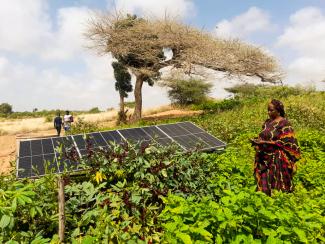Access to water has long been a challenge for Awa Mbaye Diop, a farmer in Potou, a rural town in northwest Senegal. Potou is arid, so it faces the threat of accelerating desertification due to climate change. The wet season lasts for just three months, usually from July to September. More than in the past, however, rainy seasons provide less rain. Reduced rainfall makes it difficult to get enough water for crops in the dry months.
Awa grows vegetables, particularly onions, cabbage, and carrots. Her vegetables not only feed her family, but are her primary source of income. When she was young, Awa would spend hours drawing water by hand, bucket after bucket, to water her crops. Then she was able to procure a diesel water pump. Fuel was expensive, however, and the pump would break down. Then the repeated breakdowns forced her to call on her children to water her field, at the expense of their schooling.
"Before we had great difficulties, sometimes it was impossible to find a fuel seller, other times we had to sell livestock or jewelry to buy fuel. Sometimes I even had to buy fuel at the expense of my family's care. My son in high school had to suspend his studies and I was unable to buy sanitary napkins for my teenage daughter." - Awa Mbaye Diop
To combat problems such as these, Feed the Future Sénégal Nafoore Warsaaji has been working with its partners to make solar-powered water pumps accessible to women throughout Sénégal. Solar-powered pumps help women save money and time, making them more financially independent, and allowing their children to pursue an education. In just a few months after using her new solar-powered water pump, this mother of eight children has doubled the land area she cultivates from approximately .5 hectares to 1 hectare. She has also reduced the seasonal costs of operations by approximately $600 (FCFA 369,600). These savings have translated into a significant increase in income. Not only is Awa better able to support her family, but she has been able to accumulate savings and afford school fees for her children.
"With solar, the budget I used to allocate to diesel is now used for the welfare and schooling of my family. My work time is less demanding, so I can devote more time to my children's education. I can also cultivate on a larger surface, and all year long.” - Awa Mbaye Diop
Nafoore Warsaaji is working with 15 cooperatives, of which 5,921 of its 6,309 members are women. Awa is a member of the Cooperative of Women Producers of Potou. Like Awa, 132 other women from the Cooperative have benefited from these 18 solar-powered water pumps (representing an investment of approximately $65,000 or FCFA 40,513,306). Collaborating with the Senegalese solar technology company IBRIZ and local microfinance partner Crédit Mutuel du Sénégal (CMS), Nafoore Warsaaji has facilitated the installation of a total of 247 solar pumps, representing financing of about $810,435 (FCFA 500,848,000) and 520 hectares covered, to benefit small producers (of which 80 are women) in the Feed the Future zones of influence. Nafoore Warsaaji, in partnership with ICCO (part of the international development network Cordaid), offset the cost of the pumps by 30-40%, making them more affordable for rural farmers. Nafoore Warsaaji also works with local microfinance partners like CMS to make sure qualifying farmers are eligible for loans with appropriate terms and conditions. Nafoore Warsaaji also works with solar energy equipment providers, such as Bonenergie Solar, to properly design, install, and service the pumps to ensure farmers reap the full benefit of the new technology.
As a climate-friendly technology, solar power not only reduces greenhouse gas (GHG) emissions, as Awa’s story shows, it helps smallholder farmers reduce their operational expenses. These solar-powered water pumps are just one way in which Feed the Future Senegal Nafoore Warsaaji uses technology to change lives while it helps improve agricultural productivity, increase rural incomes, and reduce GHG emissions.

